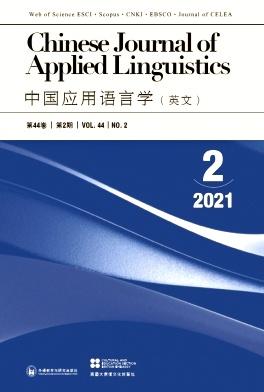Does the Functional Load Principle Predict How Important Phonemic Contrasts Are to Intelligibility Among ELF Users? A Partial Replication of From an ELF Perspective
IF 1.1
4区 教育学
Q3 EDUCATION & EDUCATIONAL RESEARCH
引用次数: 0
Abstract
Abstract The Functional Load (FL) principle predicts that high FL phonemic contrasts, such as /i:/ and /ɪ/, contribute more to the mutual intelligibility of pronunciation than low FL phonemic contrasts, such as /u:/ and /ʊ/. In order to assess whether the FL principle accurately predicts intelligibility under English as a Lingua Franca (ELF) conditions, this study partially replicated the first study to empirically support the FL principle: Munro and Derwing (2006). Chinese speakers of English recorded 24 sentences containing target words with high and low FL phoneme substitutions, and 171 Japanese university students listened to the sentences and transcribed the target words into standard orthography. The hypothesis of this study is that the target words with high FL phoneme substitutions will be less intelligible than the target words with low FL phoneme substitutions. The results showed that the target words with high FL phoneme substitutions were indeed lower in intelligibility than the target words with low FL phoneme substitutions, and furthermore cumulative high FL phoneme substitutions lower intelligibility even more. The results are consistent with Munro and Derwing’s (2006) finding that high FL phoneme substitutions lower comprehensibility more than low FL phoneme substitutions, and thus this study claims to have replicated one aspect of their study even under ELF conditions.功能负荷原理是否预测了语音对比对ELF用户的可理解性有多重要?ELF视角下的部分复制
功能负荷(Functional Load, FL)原理预测,高FL音位对比(如/i:/和/ / /)比低FL音位对比(如/u:/和/ ku /)对语音的相互可理解性贡献更大。为了评估FL原则是否准确地预测了英语作为通用语(ELF)条件下的可理解性,本研究部分复制了第一项研究,以实证支持FL原则:Munro和Derwing(2006)。说英语的中国人记录了24个含有高低音位替换的目标词的句子,171名日本大学生听这些句子并将目标词转录成标准的正字法。本研究的假设是高音位置换的目标词比低音位置换的目标词的可理解性更低。结果表明,高音位置换的目标词的可理解性确实比低音位置换的目标词低,而且累积的高音位置换对可理解性的影响更大。结果与Munro和Derwing(2006)的发现一致,即高FL音位替换比低FL音位替换更能降低可理解性,因此本研究声称即使在ELF条件下也复制了他们研究的一个方面。
本文章由计算机程序翻译,如有差异,请以英文原文为准。
求助全文
约1分钟内获得全文
求助全文
来源期刊

Chinese Journal of Applied Linguistics
EDUCATION & EDUCATIONAL RESEARCH-
CiteScore
1.50
自引率
0.00%
发文量
377
期刊介绍:
The Chinese Journal of Applied Linguistics (CJAL) (formerly known as Teaching English in China – CELEA Journal) was created in 1978 as a newsletter by the British Council, Beijing. It is the affiliated journal of the China English Language Education Association (founded in 1981 and now the Chinese affiliate of AILA [International Association of Applied Linguistics]). The Chinese Journal of Applied Linguistics is the only English language teaching (ELT) journal in China that is published in English, serving as a window to Chinese reform on ELT for professionals in China and around the world. The journal is internationally focused, fully refereed, and its articles address a wide variety of topics in Chinese applied linguistics which include – but also reach beyond – the topics of language education and second language acquisition.
 求助内容:
求助内容: 应助结果提醒方式:
应助结果提醒方式:


